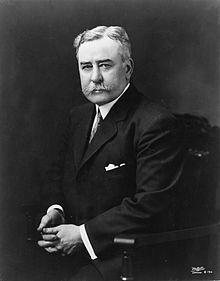Carter Harrison Jr.
Carter Henry Harrison IV | |
|---|---|
 | |
| Mayor of Chicago | |
| In office 1911–1915 | |
| Preceded by | Fred A. Busse |
| Succeeded by | William Hale Thompson |
| In office 1897–1905 | |
| Preceded by | George Bell Swift |
| Succeeded by | Edward Fitzsimmons Dunne |
| Personal details | |
| Born | April 23, 1860 Chicago, Illinois |
| Died | December 25, 1953 (aged 93) Chicago, Illinois |
| Political party | Democratic |
| Spouse | Edith Ogden |
| Children | Carter Harrison V, Edith Ogden Harrison II |
| Residence(s) | Chicago, Illinois |
This article needs additional citations for verification. (January 2017) |
Carter Henry Harrison IV (April 23, 1860 – December 25, 1953) was an American politician who served as Mayor of Chicago, Illinois (1897–1905 and 1911–1915).[1] The City's 30th mayor, he was the first born in Chicago.
Biography
He was born on April 23, 1860 in Chicago.
Like his father, Carter Harrison Sr., Harrison gained election to five terms as Chicago's mayor. Educated in Saxe-Altenburg, Germany, Harrison returned to Chicago to help his brother run the Chicago Times, which their father bought in 1891. Under the Harrisons the paper became a resolute supporter of the Democratic Party, and was the only local newspaper to support the Pullman strikers in the mid-1890s.
As with his father, Harrison did not believe in trying to legislate morality. As mayor, Harrison believed that Chicagoans' two major desires were to make money and to spend it. During his administrations, Chicago's vice districts blossomed, and special maps were printed to enable tourists to find their way from brothel to brothel. The name of one Chicago saloon-keeper of the time supposedly entered the English language as a term for a strong or laced drink intended to render unconsciousness: Mickey Finn.

However, Harrison was seen as more of a reformer than his father, which helped him garner the middle class votes his father had lacked. One of Harrison's biggest enemies was Charles Yerkes, whose plans to monopolize Chicago's streetcar lines were vigorously attacked by the mayor. During his final term in office, Harrison established the Chicago Vice Commission and worked to close down the Levee district, starting with the Everleigh Club brothel on October 24, 1911.[2]
In spite of prolonged and very damaging international press coverage attaching responsibility to him for the 602 lives lost in the Iroquois Theatre fire on December 30, 1903, [3]Harrison was a hopeful for the 1904 Democratic nomination for President, but was unable to negotiate his way through a tangle of conflicting loyalies to different Party bosses; the nomination went to Alton B. Parker, who was soundly defeated by Theodore Roosevelt.


In 1915, when Harrison left office, Chicago had essentially reached its modern size in land area, and had a population of 2,400,000; the city was moving inexorably into its status as a major modern metropolis. He and his father had collectively been mayor of the city for 21 of the previous 36 years.
He died in Chicago on December 25, 1953, and is buried in Graceland Cemetery.[5]
Legacy
Harrison wrote his autobiography, not once but twice; his wife, Edith Ogden Harrison, was a well-known writer of children's books and fairy tales in the first two decades of the twentieth century.
He was a member of many organizations including the Freemasons, Knights Templar, the Society of the Cincinnati, Sons of the Revolution, Sons of the American Revolution, Society of Colonial Wars, Veterans of Foreign Wars, American Legion and the Military Order of the World Wars.
Ancestry
Harrison was a descendant of Robert Carter I, Benjamin Harrison IV, William Randolph, and Isham Randolph of Dungeness.[6][7]
References
- ^ "Inventory of the Carter H. Harrison IV Papers, 1637-1953, Bulk 1840-1950". Newberry. Retrieved 1 September 2017.
- ^ "Starts Vice War; Mayor in Fight to Clean Up City". Chicago Daily Tribune. Chicago Tribune. 1911-10-25. p. 1.
- ^ Tinder Box: The iroquois Theatre Disaster 1903", Anthony P. Hatch, Academy Chicago Publishers; 2003
- ^ Donovan, Henry. "Chicago Eagle". Illinois Digital Newspaper Collections. Retrieved 29 June 2015.
- ^ "Mayor Carter Henry Harrison IV Biography". Chicago Public Library. Chicago Public Library. Retrieved September 9, 2017.
- ^ Abbot, Willis John (1895). "The Harrison Family". Carter Henry Harrison: A Memoir. New York: Dodd, Mead & Company. pp. 1–23.
{{cite book}}: Cite has empty unknown parameter:|month=(help); External link in|chapterurl=|chapterurl=ignored (|chapter-url=suggested) (help) - ^ Page, Richard Channing Moore (1893). "Randolph Family". Genealogy of the Page Family in Virginia (2 ed.). New York: Press of the Publishers Printing Co. pp. 249–272.
{{cite book}}: Cite has empty unknown parameter:|month=(help); External link in|chapterurl=|chapterurl=ignored (|chapter-url=suggested) (help)
External links
- Mayor Carter Henry Harrison Papers at the Newberry Library
- Carter H. Harrison at Library of Congress, with 5 library catalog records (previous page of browse report under 'Harrison, Carter H. (Carter Henry), 1825–1893')
